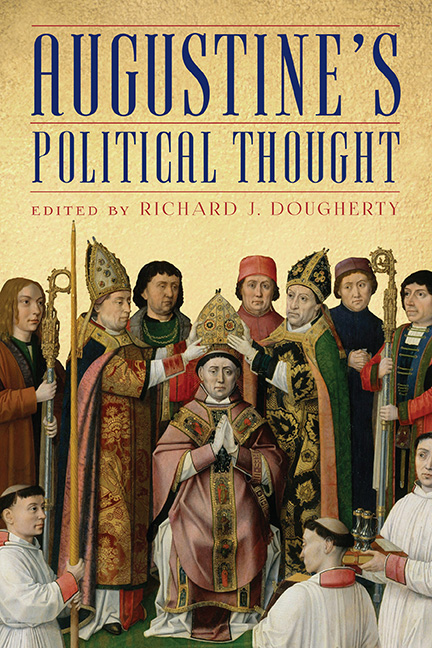Book contents
- Frontmatter
- Contents
- Acknowledgments
- Introduction
- Part 1 Politics, Nature, and Virtue
- 1 St. Augustine and the Problem of Political Ethics in The City of God
- 2 The Other Happy Life: The Political Dimensions to St. Augustine's Cassiciacum Dialogues
- 3 Peace in the Order of Nature: Augustine, Giles, and Dante
- 4 Deeds and Words: Latreia, Justice, and Mercy in Augustine's Political Thought
- 5 The Investigation of Justice in Augustine's Confessions
- Part 2 St. Augustine and Ancient Political Philosophy
- Notes on Contributors
- Index
2 - The Other Happy Life: The Political Dimensions to St. Augustine's Cassiciacum Dialogues
from Part 1 - Politics, Nature, and Virtue
Published online by Cambridge University Press: 26 June 2019
- Frontmatter
- Contents
- Acknowledgments
- Introduction
- Part 1 Politics, Nature, and Virtue
- 1 St. Augustine and the Problem of Political Ethics in The City of God
- 2 The Other Happy Life: The Political Dimensions to St. Augustine's Cassiciacum Dialogues
- 3 Peace in the Order of Nature: Augustine, Giles, and Dante
- 4 Deeds and Words: Latreia, Justice, and Mercy in Augustine's Political Thought
- 5 The Investigation of Justice in Augustine's Confessions
- Part 2 St. Augustine and Ancient Political Philosophy
- Notes on Contributors
- Index
Summary
Though they are often overlooked or studied for diff erent reasons, St. Augustine's Cassiciacum dialogues have a subtle yet important political dimension. Much of Augustine's conversation with his interlocutors implicitly hinges on matters concerning political philosophy, as does the very dialogue format Augustine chooses. Yet on the other hand, the focal points of the dialogues are essentially nonpolitical, and some of Augustine's statements can be construed as hostile to civic life and to any thoughtful refl ection on the best political order. Th is essay argues that these apparent inconsistencies are not signs of a contradictory attitude but reveal a three-pronged strategy by Augustine to forge a properly Christian attitude toward political life, a strategy that involves (1) debunking patriotic fervor, (2) infl aming the love of truth, and (3) reengaging the civitas from a higher perspective.
Any attempt to cull a cogent political theory from St. Augustine's first four extant writings (commonly referred to as the Cassiciacum dialogues) is bound to be met with a justifiable dose of skepticism. Following J. N. Figgis, scholars have tended to focus on The City of God for an understanding of Augustinian politics, while even those endeavors to extricate Augustine's political thought from the whole of his works generally ignore the early dialogues. Herbert A. Deane, in his Political and Social Ideas of St. Augustine, makes only cursory references to them, as do Robert A. Markus and R. W. Dyson. Other, less conventional treatments of the topic, such as John Milbank's provocative Theology and Social Theory and Jean Bethke Elshtain's self-reflective Augustine and the Limit of Politics, have not changed this basic taxonomy.
A preoccupation with The City of God is certainly understandable. Augustine's magnum opus is also a magnes opus, a majestic magnet drawing the politically minded reader to itself. Nevertheless, as this essay will attempt to demonstrate, there remain compelling reasons for reassessing the value of the Cassiciacum dialogues as windows into Augustine's political thought. Such a renewed appreciation is particularly important given the likely prospect (which it is also the burden of this essay to demonstrate) that these dialogues are not fully intelligible unless they are viewed in light of classical political philosophy and Augustine's conversation with it. To justify these claims, we will first offer a crude overview of the ways in which the Cassiciacum dialogues may or may not be deemed “political.”
- Type
- Chapter
- Information
- Augustine's Political Thought , pp. 36 - 52Publisher: Boydell & BrewerPrint publication year: 2019

